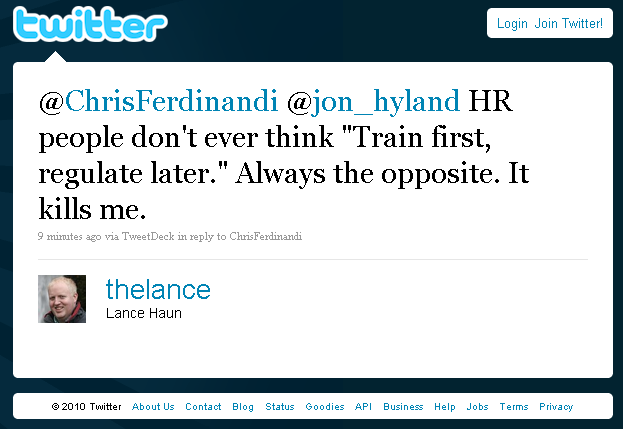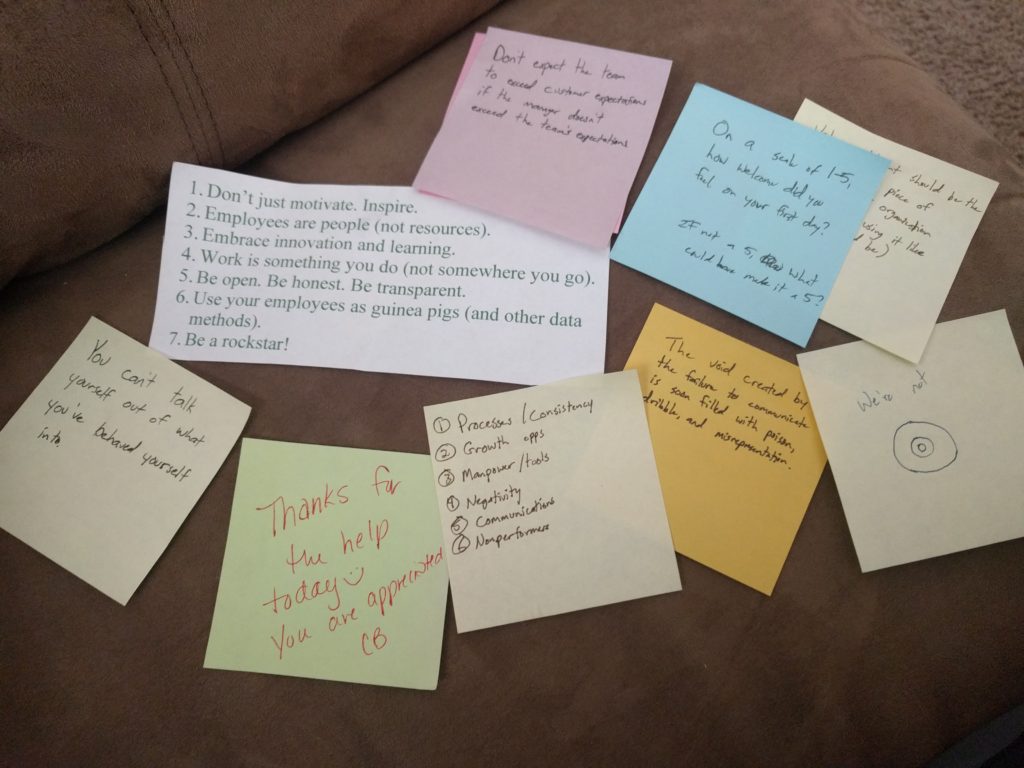 One of the sites I follow regularly is Ask a Manager, where Alison Green shares her thoughts and wisdom on management, job hunting, and the workplace. With a wildly popular site like hers, she gets all kinds of questions from readers about different situations. I wanted to take the opportunity to get her thoughts on our (HR) side of the fence, so I pitched her a few questions. She was gracious enough to answer in detail, so check out the great Q&A below!
One of the sites I follow regularly is Ask a Manager, where Alison Green shares her thoughts and wisdom on management, job hunting, and the workplace. With a wildly popular site like hers, she gets all kinds of questions from readers about different situations. I wanted to take the opportunity to get her thoughts on our (HR) side of the fence, so I pitched her a few questions. She was gracious enough to answer in detail, so check out the great Q&A below!
—
Ben: So, Alison, I see that one of your more typical answers to questions from job seekers and workers is, “No, don’t go to HR” when responding to letters you receive. Working in HR, there are times I would like to see some of the requests that these people raise. I understand that HR can be backward and bumbling at times, and for some organizations it can even be an evil arm of management dedicated to squeezing the life out of employees. So, what sorts of instances would you recommend someone actually contact HR for help, assuming no evil intent?
Alison: I'd say there are four main categories of times when I suggest people talk to HR instead of their manager: (1) to report harassment, (2) to report discrimination based on a protected class like race, sex, religion, disability, etc., (3) when they want to take advantage of a protection guaranteed by the government, such as FMLA leave, and (4) with questions about or issues with benefits.
In very limited circumstances, I might also suggest going to HR about an issue with your boss — but not as a general rule. If your boss is yelling or being abusive, then yes. Or if your boss is doing something that clearly your company would be horrified to know about (like dating a subordinate or directing people to violate a safety rule or never permitting anyone to use sick leave).
But if you just don't like your boss or have relatively mild issues with her, that's not a matter for HR. In some companies, it can be helpful to go to HR to get ADVICE on how to navigate a tricky relationship with a boss — advice, not intervention. But you have to know your HR department to know if that makes sense; some are great at giving advice in those situations and others will turn around and share the conversation with your boss, and not in a helpful way.
Ben: That’s excellent advice, and I’d agree that those are the times HR actually wants to hear from people. So, what qualifies a company as having “good” HR in your opinion, both as a manager and employee?
Alison:Â I'd say that a good HR department one that's highly aligned with the organization’s culture and goals and does excellent work in areas like ensuring that managers are well-trained, benefits are strong and well-administered, salaries are benchmarked to industry norms, and that they help rather than hinder a company’s managers (for instance, by finding nuanced, flexible solutions rather than requiring everyone to operate the same across the board, which is a hallmark of a bad HR department). A good HR department can help managers get more done, more effectively.
Ben: I love that explanation, especially around flexibility. I always thought that was an incredible power (for good or evil) that companies often used poorly. As a former manager who now coaches managers frequently, what relationship do you advise for managers to have with the HR team?
Alison: If you have a good HR department, they can be a great resource to managers — a source of advice on all sorts of tricky issues, from delivering tough feedback to navigating hiring dilemmas to helping retain your best people. If you have a bad HR department, I recommend an avoidance strategy.
Ben: Give me a couple of the most common reasons people say they plan to reach out to HR that cause you to just shake your head at them.
Alison: I think sometimes people think of HR as being neutral referees who they can go to when they have a problem with a coworker or are upset with their manager; they think HR will mediate for them, which of course isn't exactly how it works. I hear a lot of things like “should I talk to HR about my coworker who won't stop playing her music too loudly†or “can HR help me if my boss is nitpicking my work?”
Ben: Referencing the last question, I often see this when people are having petty squabbles with managers or peers. Do you think decision to “go to HR” is just an inability to emotionally distance themselves from the situation, a lack of understanding of what HR actually does, a last ditch effort when all else seems to fail, or something else entirely?
Alison: I think it's a lack of understanding of what HR actually does. It's the idea I mentioned above that they'll be a neutral referee. I also think people often think HR is there to be their advocate and don't understand that HR is there to serve the needs of the business. Of course, in some cases that means advocating for employees against bad managers, because it’s in the best interests of employers to retain great employees, spot and address bad management, and nip legal problems in the bud. But lots of other times, what’s best for the employer might not be what’s best for the employee, and the best interests of the employer will always win out. Employees don't always get that that's how it's supposed to work.
I also think people often go to HR for things they should be trying to solve themselves. It's why so often when HR reps ask people, “Have you talked about this directly with the person you're complaining about?†the answer is no. And that's not surprising — I mean, my mail is full of letters from people who are looking for ways to avoid having a direct, semi-awkward conversation with a coworker or a manager; everyone hopes there might be a solution that will get them out of having a tough conversation that they'd rather avoid.
Ben: That’s entirely true, and I’ve seen it in pretty much every company I’ve ever worked for. Let’s shift a bit on this last question, because I know you have a big chunk of your audience in the form of job seekers looking for advice. On the recruiting side, I completely agree with you about candidates not “reaching out to HR to follow up.” We hate that and it just slows things down (hint: we often have other things besides recruiting going on, and while recruiting is a big deal for you it might be a relatively small priority in the bigger scheme of things). So, is there a time or two that makes sense for a candidate to reach out to HR?
Alison: If you've been interviewed, and they told you they'd get back to you in X amount of time, and it's a week past X. At that point, it's reasonable to reach out and see if there's an update on the timeline.
Or if you've been interviewed and you have another offer that you need to respond to, so that the company has a chance to expedite things if they're interested in you.
Otherwise, I know it's tempting to follow up and ask for updates, but really, if the company wants to hire you, they're not going to forget about you. People do know that on some level, but it's so normal to feel anxious and want closure and everything else that makes job searching so emotionally difficult.
—
Thanks again to Alison for spending some time with us! Please follow her on Twitter and check out her site if you haven’t already. Here are a few good stories that you don’t want to miss:
What did you think of Alison’s honest opinions about HR from a manager’s point of view? Do you agree or disagree?



 When I was recruiting, I wanted to find out from the candidate early on, whether through a job application question or through an informal conversation, what sort of salary range they were looking for. If it wasn’t offered, I would share the range of the opening early in the process. Was I showing my cards? Yes. But I was also attempting to conserve a valuable resource: time.
When I was recruiting, I wanted to find out from the candidate early on, whether through a job application question or through an informal conversation, what sort of salary range they were looking for. If it wasn’t offered, I would share the range of the opening early in the process. Was I showing my cards? Yes. But I was also attempting to conserve a valuable resource: time.  One of the sites I follow regularly is
One of the sites I follow regularly is  Breaking News: Micromanagement has the last word, now recognized as valuable business practice
Breaking News: Micromanagement has the last word, now recognized as valuable business practice A while back I was reading a story about a CEO being asked to return to his company after stepping down from the role years before. As usual, I started tying the thoughts back to HR and how that sort of “boomerang†employee, at any level of the company, might approach the decision to return.
A while back I was reading a story about a CEO being asked to return to his company after stepping down from the role years before. As usual, I started tying the thoughts back to HR and how that sort of “boomerang†employee, at any level of the company, might approach the decision to return. I hope you enjoyed the interview with Mary Faulkner! You can follow her on
I hope you enjoyed the interview with Mary Faulkner! You can follow her on